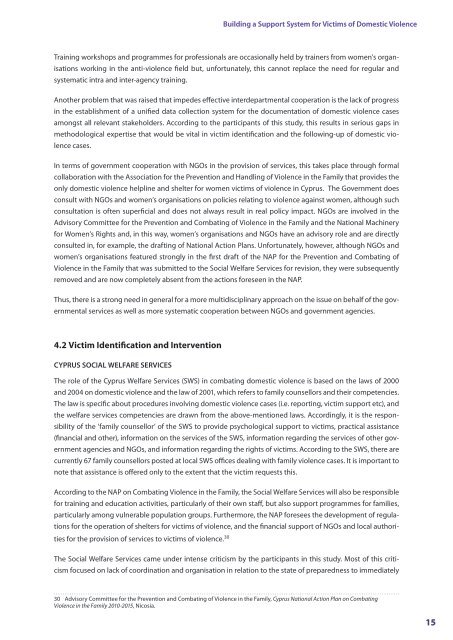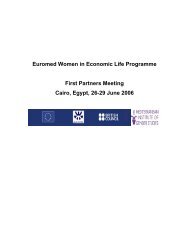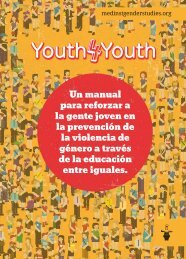react to domestic violence
react to domestic violence
react to domestic violence
You also want an ePaper? Increase the reach of your titles
YUMPU automatically turns print PDFs into web optimized ePapers that Google loves.
Building a Support System for Victims of Domestic Violence<br />
Training workshops and programmes for professionals are occasionally held by trainers from women’s organisations<br />
working in the anti-<strong>violence</strong> field but, unfortunately, this cannot replace the need for regular and<br />
systematic intra and inter-agency training.<br />
Another problem that was raised that impedes effective interdepartmental cooperation is the lack of progress<br />
in the establishment of a unified data collection system for the documentation of <strong>domestic</strong> <strong>violence</strong> cases<br />
amongst all relevant stakeholders. According <strong>to</strong> the participants of this study, this results in serious gaps in<br />
methodological expertise that would be vital in victim identification and the following-up of <strong>domestic</strong> <strong>violence</strong><br />
cases.<br />
In terms of government cooperation with NGOs in the provision of services, this takes place through formal<br />
collaboration with the Association for the Prevention and Handling of Violence in the Family that provides the<br />
only <strong>domestic</strong> <strong>violence</strong> helpline and shelter for women victims of <strong>violence</strong> in Cyprus. The Government does<br />
consult with NGOs and women’s organisations on policies relating <strong>to</strong> <strong>violence</strong> against women, although such<br />
consultation is often superficial and does not always result in real policy impact. NGOs are involved in the<br />
Advisory Committee for the Prevention and Combating of Violence in the Family and the National Machinery<br />
for Women’s Rights and, in this way, women’s organisations and NGOs have an advisory role and are directly<br />
consulted in, for example, the drafting of National Action Plans. Unfortunately, however, although NGOs and<br />
women’s organisations featured strongly in the first draft of the NAP for the Prevention and Combating of<br />
Violence in the Family that was submitted <strong>to</strong> the Social Welfare Services for revision, they were subsequently<br />
removed and are now completely absent from the actions foreseen in the NAP.<br />
Thus, there is a strong need in general for a more multidisciplinary approach on the issue on behalf of the governmental<br />
services as well as more systematic cooperation between NGOs and government agencies.<br />
4.2 Victim Identification and Intervention<br />
CYPRUS SOCIAL WELFARE SERVICES<br />
The role of the Cyprus Welfare Services (SWS) in combating <strong>domestic</strong> <strong>violence</strong> is based on the laws of 2000<br />
and 2004 on <strong>domestic</strong> <strong>violence</strong> and the law of 2001, which refers <strong>to</strong> family counsellors and their competencies.<br />
The law is specific about procedures involving <strong>domestic</strong> <strong>violence</strong> cases (i.e. reporting, victim support etc), and<br />
the welfare services competencies are drawn from the above-mentioned laws. Accordingly, it is the responsibility<br />
of the ‘family counsellor’ of the SWS <strong>to</strong> provide psychological support <strong>to</strong> victims, practical assistance<br />
(financial and other), information on the services of the SWS, information regarding the services of other government<br />
agencies and NGOs, and information regarding the rights of victims. According <strong>to</strong> the SWS, there are<br />
currently 67 family counsellors posted at local SWS offices dealing with family <strong>violence</strong> cases. It is important <strong>to</strong><br />
note that assistance is offered only <strong>to</strong> the extent that the victim requests this.<br />
According <strong>to</strong> the NAP on Combating Violence in the Family, the Social Welfare Services will also be responsible<br />
for training and education activities, particularly of their own staff, but also support programmes for families,<br />
particularly among vulnerable population groups. Furthermore, the NAP foresees the development of regulations<br />
for the operation of shelters for victims of <strong>violence</strong>, and the financial support of NGOs and local authorities<br />
for the provision of services <strong>to</strong> victims of <strong>violence</strong>. 30<br />
The Social Welfare Services came under intense criticism by the participants in this study. Most of this criticism<br />
focused on lack of coordination and organisation in relation <strong>to</strong> the state of preparedness <strong>to</strong> immediately<br />
30 Advisory Committee for the Prevention and Combating of Violence in the Family, Cyprus National Action Plan on Combating<br />
Violence in the Family 2010-2015, Nicosia.<br />
15







